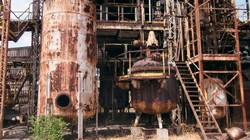The World Cinema Series recently held a discussion on the film “Bhopal: A Prayer for Rain” as part of its “A Delicate Balance: Global Communities and the Natural Environment.” theme on Tuesday, Jan. 26. The discussion featured an introduction from Professor Thomas Pearson, as well as words from Datta Naik, Ph.D., Professor of Chemistry, and Marina Vujnovic, Ph.D., Associate Professor of Communication and an expert on global communication.
“Bhopal: A Prayer for Rain,” is a docudrama that analyzes the Union Carbide plant chemical leak in Bhopal, India, that killed as many as 10,000 people in the city and its surrounding areas.
“[The director, Ravi Kumar] discovered that hardly any of the younger generation knew about the Bhopal disaster,” Pearson explained. “He decided this was a film that had to be made, and he set about working up a script with David Brooks Miller. In the process of writing the script, Kumar busied himself by researching the technical facts for the film and analyzing the documents of the court proceedings.”
 Naik outlined the history of neglect which led to the Union Carbide plant chemical leak incident. “In 1980, demand for Carbaryl pesticide started to decline due to availability of competing pesticides,” Naik explained. “The 1984 drought further cut the demand, but production continued.”
Naik outlined the history of neglect which led to the Union Carbide plant chemical leak incident. “In 1980, demand for Carbaryl pesticide started to decline due to availability of competing pesticides,” Naik explained. “The 1984 drought further cut the demand, but production continued.”
Maintenance and safety measures were neglected as profitability of the company declined. Pollution within the plant was high because small control mechanisms were not repaired or maintained, Naik said.
“[During 1981], some phosgene splashed on a worker who died within 3 days due to inhalation of the deadly gas,” Naik said. “In 1982, more phosgene leaks occurred, exposing 24 workers who did not wear protective equipment. In addition, there were numerous incidents of Methyl Isocyanate (MIC) leaks affecting several workers. Leaks of other toxic chemicals also occurred. Workers’ warnings about the problem were not taken seriously.”
Other safety neglect issues which lead to the disaster include a flare tower being under repair during the time of the leak. A warning alarm sound was also deactivated as to avoid panic among nearby citizens.
Vujnovic has used the corporate case of the Bhopal disaster as a case study in her global communications course.
“We say, well, accidents happen, right?” Vujnovic began. “But when we look and trace, we see that accidents actually rarely happen. There is neglect, or errors that are committed not once, but multiple times in instances like this.”
IMAGE TAKEN from Der Spiegel
IMAGE TAKEN from Amazon




